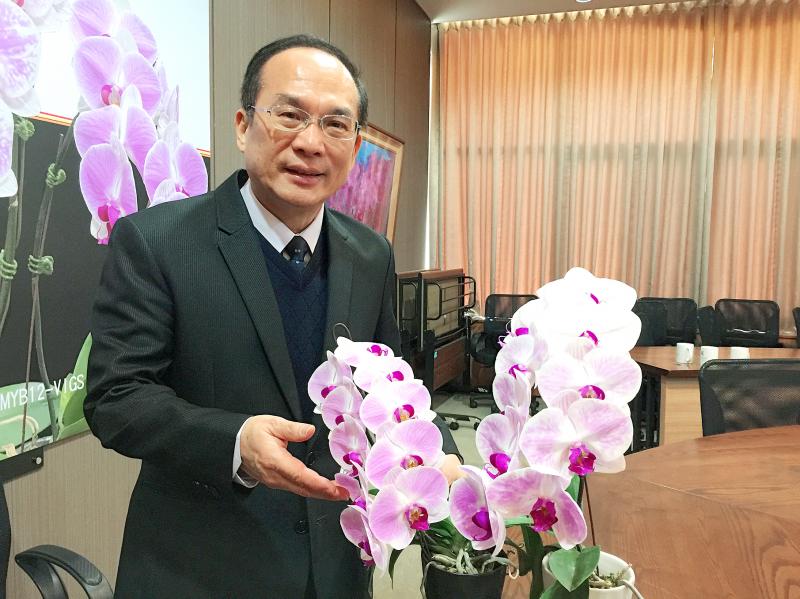National Chung Hsing University (NCHU) researchers have discovered certain genes in orchids that can be used to manipulate flower hue, prolong the flowering period and prevent wilting, which could reduce the time needed to produce new orchid varieties from seven years to two months.
There are more than 28,000 varieties of orchids, making them one of the largest and most diverse families of flowering plants, NCHU vice president and Graduate Institute of Biotechnology professor Yang Chang-hsien (楊長賢) said on Wednesday.
The popularity of orchids lies in their flowers, which are defined by a symmetrical perianth — the non-reproductive elements of the flower — separated by a distinct petal called the lip or labellum that attracts insects, he said.

Photo: Su Meng-chuan, Taipei Times
Five years ago, a research team led by Yang developed the “perianth password” theory, which discovered the L and SP complexes behind orchid petal formation.
The SP complex determines sepal and petal formation, while the L complex determines the identity of the lip.
In a paper published on Feb. 10 in Nature Communications, the team said that the SP complex not only moderates sepal and petal formation, but also pigmentation, deterioration, shedding and other life cycle processes.
Three of the genes involved in the creation of the SP complex can change the color of the flower, Yang said.
These proteins can be suppressed through gene silencing to reduce anthocyanin — or pigment — accumulation, in effect bleaching the flower, he said.
He provided two samples, one of a purple-red moth orchid that became significantly whiter after intervention, and the other of an orange moth orchid that became yellow.
Also using gene silencing, other proteins in the SP complex can be suppressed to make the flowers age or the stem harden prematurely, ensuring that the flowers do not fall off even when withered, Yang said.
It takes seven to eight years to cultivate new types of orchids through relatively unpredictable cross-breeding, but with this method, a new color could be produced in as little as two months, he said.
The flowering period could also be stretched longer than the standard 80 to 100 days, he added.
Yang said the discovery refutes the assumption that the genes governing flower formation retreat after the floral organs are formed, showing that these mechanisms remain important in other stages of flower development.
The finding is a breakthrough in the field of international flower research, he said.
It also has practical implications, as the technique can increase the output diversity and value of the domestic orchid market, he added.
Other article authors include NCHU postdoctoral researchers Hsu Hsing-fun, Chen Wei-han, Hsu Wei-han and Mao Wan-ting, as well as master’s degree student Shen Yi-hsuan.

WANG RELEASED: A police investigation showed that an organized crime group allegedly taught their clients how to pretend to be sick during medical exams Actor Darren Wang (王大陸) and 11 others were released on bail yesterday, after being questioned for allegedly dodging compulsory military service or forging documents to help others avoid serving. Wang, 33, was catapulted into stardom for his role in the coming-of-age film Our Times (我的少女時代). Lately, he has been focusing on developing his entertainment career in China. The New Taipei District Prosecutors’ Office last month began investigating an organized crime group that is allegedly helping men dodge compulsory military service using falsified documents. Police in New Taipei City Yonghe Precinct at the end of last month arrested the main suspect,

A cat named Mikan (蜜柑) has brought in revenue of more than NT$10 million (US$305,390) for the Kaohsiung MRT last year. Mikan, born on April 4, 2020, was a stray cat before being adopted by personnel of Kaohsiung MRT’s Ciaotou Sugar Refinery Station. Mikan was named after a Japanese term for mandarin orange due to his color and because he looks like an orange when curled up. He was named “station master” of Ciaotou Sugar Refinery Station in September 2020, and has since become famous. With Kaohsiung MRT’s branding, along with the release of a set of cultural and creative products, station master Mikan

LITTORAL REGIMENTS: The US Marine Corps is transitioning to an ‘island hopping’ strategy to counterattack Beijing’s area denial strategy The US Marine Corps (USMC) has introduced new anti-drone systems to bolster air defense in the Pacific island chain amid growing Chinese military influence in the region, The Telegraph reported on Sunday. The new Marine Air Defense Integrated System (MADIS) Mk 1 is being developed to counter “the growing menace of unmanned aerial systems,” it cited the Marine Corps as saying. China has constructed a powerful defense mechanism in the Pacific Ocean west of the first island chain by deploying weapons such as rockets, submarines and anti-ship missiles — which is part of its anti-access/area denial (A2/AD) strategy against adversaries — the

Eleven people, including actor Darren Wang (王大陸), were taken into custody today for questioning regarding the evasion of compulsory military service and document forgery, the New Taipei District Prosecutors’ Office said. Eight of the people, including Wang, are suspected of evading military service, while three are suspected of forging medical documents to assist them, the report said. They are all being questioned by police and would later be transferred to the prosecutors’ office for further investigation. Three men surnamed Lee (李), Chang (張) and Lin (林) are suspected of improperly assisting conscripts in changing their military classification from “stand-by